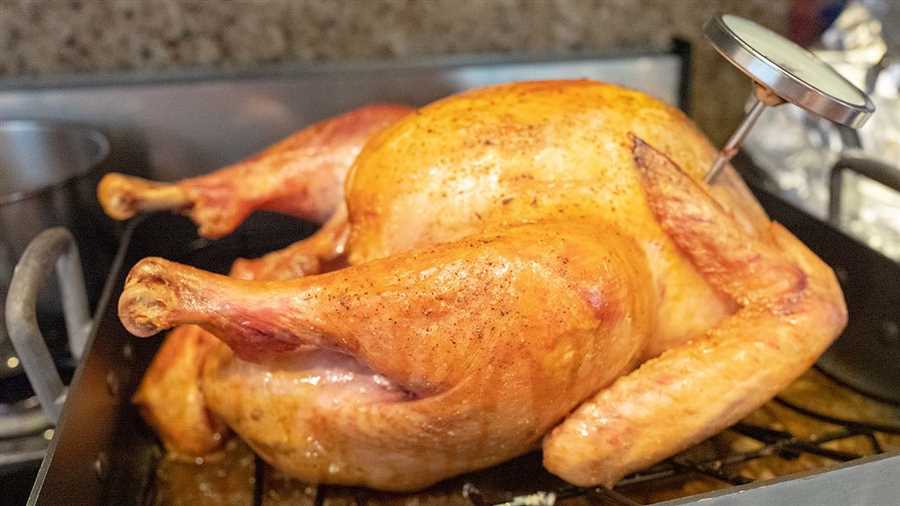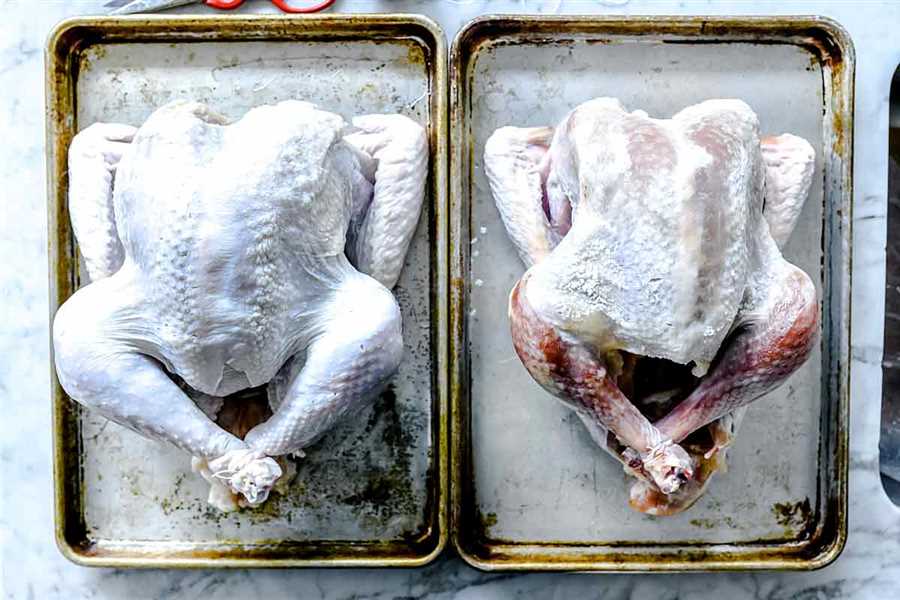Many home cooks have grown up with the tradition of rinsing poultry, including turkey, before cooking it. However, is this really necessary? The answer may surprise you.
According to food safety experts, rinsing raw turkey before cooking it can actually be more harmful than beneficial. When you rinse raw poultry, you may think that you are removing bacteria and other contaminants, but in reality, you are spreading them all over your sink and kitchen surfaces.
When water comes into contact with raw poultry, it can cause bacteria to splash up to 3 feet away, spreading potentially harmful pathogens. This can contaminate your countertops, cutting boards, utensils, and anything else nearby. Even a small amount of bacteria can cause foodborne illness.
Instead of rinsing your turkey, it is recommended to pat it dry with paper towels. This will remove any excess moisture and help the skin crisp up during cooking. Remember to wash your hands thoroughly with soap and water after handling raw poultry to avoid cross-contamination.
Why Rinsing Turkey Before Cooking Is Questionable
Many people have been taught that rinsing a turkey before cooking is an essential step to remove bacteria and make the meat cleaner. However, recent studies and expert opinions suggest that this practice may not be necessary and could even pose some risks.
The Risk of Cross-Contamination
Rinsing a turkey before cooking can lead to cross-contamination in your kitchen. When you rinse the turkey, water droplets can spread bacteria onto countertops, utensils, and other food items nearby. This can increase the risk of foodborne illnesses, especially if the bacteria are not completely killed during cooking.
In fact, the Food Safety and Inspection Service (FSIS) of the United States Department of Agriculture (USDA) recommends not washing or rinsing any meat before cooking, including turkey. This is because bacteria on raw meat are easily killed during the cooking process, and any water used in rinsing can actually splatter bacteria onto surfaces.
Impact on Cooking Process

Rinsing a turkey before cooking can also affect the cooking process and the final result. When you rinse the turkey, the water can partially wash away the natural juices and moisture present in the meat. This can result in a less juicy and flavorful turkey.
Furthermore, rinsing the turkey might make it harder for the skin to become crisp during roasting. The excess moisture on the surface of the turkey can create steam, preventing the skin from browning properly.
Instead of rinsing the turkey, it is recommended to pat it dry with paper towels before cooking. This removes any excess moisture without the risk of cross-contamination.
Conclusion
In conclusion, rinsing a turkey before cooking is questionable and might not be necessary. It can increase the risk of cross-contamination and affect the cooking process. The best practice is to follow the guidelines provided by food safety authorities and avoid rinsing the turkey. By properly cooking the turkey, any bacteria present on the meat will be eliminated, ensuring a safe and delicious meal.
Food Safety Concerns
When it comes to turkey, food safety is of utmost importance. Handling raw turkey properly can prevent foodborne illnesses caused by bacteria such as Salmonella or Campylobacter. Here are some food safety concerns to keep in mind:
- Cross-Contamination: Raw turkey can contain harmful bacteria that can easily spread to other foods, utensils, and surfaces. It is important to avoid cross-contamination by using separate cutting boards, utensils, and dishes for raw turkey.
- Thawing: Thawing turkey should be done safely to prevent the growth of bacteria. It is recommended to thaw turkey in the refrigerator, in a microwave, or in a cold water bath, changing the water every 30 minutes.
- Rinsing: Contrary to popular belief, rinsing turkey before cooking is not recommended. Rinsing can actually spread bacteria onto kitchen surfaces, clothes, and utensils through water droplets. The heat of cooking will kill any bacteria present, so rinsing is unnecessary.
- Cooking Temperature: It is crucial to cook turkey to a safe internal temperature to kill any bacteria present. The desired temperature is 165°F (74°C) for the meat and stuffing.
- Storing Leftovers: Leftover turkey should be refrigerated within two hours of cooking to prevent bacterial growth. It is best to store it in shallow containers to allow for quick cooling.
By following these food safety guidelines, you can enjoy a delicious and safe turkey meal. Remember to always prioritize food safety to protect the health of yourself and those around you.
Cross-Contamination Risks
Cross-contamination is a significant food safety concern that can occur when handling raw turkey or any type of raw meat. Cross-contamination happens when bacteria from raw meat comes into contact with other foods, utensils, or surfaces, spreading harmful bacteria and increasing the risk of foodborne illness.
During the rinsing process, water droplets can splash onto surrounding surfaces, potentially transferring bacteria from the raw turkey. This cross-contamination risk can be especially problematic when it comes to foods that won’t be cooked, such as salads or other ready-to-eat items. Consuming these contaminated foods can lead to food poisoning.
It’s important to note that cooking turkey to the proper internal temperature kills harmful bacteria, so there is no need to rinse the turkey before cooking. In fact, rinsing the turkey could actually increase the risk of cross-contamination. Instead, it’s best to handle raw turkey carefully, keeping it separate from other foods and ensuring proper cleaning and sanitizing of all surfaces and utensils that come into contact with the raw turkey.
| Cross-Contamination Risks: |
|---|
| Spreading harmful bacteria to other foods, utensils, or surfaces |
| Potential contamination of ready-to-eat items |
| Increase risk of foodborne illness |
Natural Juiciness and Flavor

One of the reasons why many people choose not to rinse a turkey before cooking is to ensure that it retains its natural juiciness and flavor. When the turkey is rinsed, some of the natural juices on the surface may be washed away, leading to a drier and less flavorful meat.
Retaining Moisture:
Rinsing a turkey before cooking can actually have the opposite effect of what is desired. The water used to rinse the turkey does not penetrate the meat, but rather sits on the surface. This added moisture can dilute the natural juices in the bird, resulting in a drier end product.
It is important to note that the turkey will release its own juices during the cooking process, which contributes to its overall moisture. By not rinsing the turkey, these juices remain intact, enhancing the natural flavor and juiciness of the meat.
Reducing Bacterial Spread:
There is also a food safety aspect to consider when it comes to rinsing a turkey. When the turkey is rinsed, any bacteria present on the surface can be spread to other surfaces, such as countertops, utensils, and sink areas. This can increase the risk of cross-contamination and foodborne illnesses.
It is important to handle raw turkey with care and follow proper food handling guidelines. This includes thoroughly washing hands, utensils, and surfaces that come into contact with the turkey, as well as cooking the turkey to the appropriate internal temperature to kill any bacteria that may be present.
In conclusion,
rinsing a turkey before cooking is not necessary and can actually have negative effects on its natural juiciness and flavor. By skipping the rinse, you can ensure that your turkey retains its moisture and tastes delicious when cooked properly.
Cooking Process Simplification
Streamlining the cooking process can save you time and effort in the kitchen. By eliminating unnecessary steps and focusing on efficient techniques, you can simplify your cooking routine without compromising the quality of your meals.
Plan Ahead
One of the key elements of simplifying the cooking process is proper planning. Make a meal plan for the week and create a shopping list accordingly. This will help ensure that you have all the necessary ingredients on hand, eliminating the need for last-minute trips to the grocery store. Additionally, prep some ingredients in advance by washing, chopping, and portioning them, which can significantly reduce prep time when you’re ready to start cooking.
One-Pot Meals
Opt for one-pot meals whenever possible. These dishes allow you to cook everything in a single pot or pan, minimizing the number of dishes you need to wash later. Not only does this save time on cleanup, but it also helps to enhance the flavors as the ingredients mingle and develop deeper tastes throughout the cooking process. Plus, one-pot meals can be an excellent way to use up leftover ingredients, reducing food waste.
Complementing Ingredients
Choose ingredients that complement each other to simplify your cooking process. For example, you can choose a main protein and then build a meal around it by selecting vegetables and grains that pair well together. This way, you can create delicious and well-balanced meals without the need for complicated and time-consuming recipes.
By following these simple tips, you can simplify your cooking process and enjoy delicious meals without spending excessive time in the kitchen. Remember, efficiency and proper planning are key to achieving a stress-free and enjoyable cooking experience.
Questions and answers
Should I rinse the turkey before cooking?
Rinsing the turkey before cooking is not necessary and can actually spread bacteria around the kitchen. Cooking the turkey to the correct internal temperature will kill any potential pathogens.
What are the risks of rinsing turkey before cooking?
Rinsing turkey before cooking can spread bacteria, specifically salmonella, to kitchen surfaces and utensils. This can increase the risk of foodborne illnesses. It is better to follow proper cooking techniques and cook the turkey to the recommended internal temperature to ensure it is safe to eat.
Can rinsing the turkey make it safer to eat?
No, rinsing the turkey does not make it safer to eat. Cooking the turkey to the proper internal temperature is what kills harmful bacteria like salmonella. Rinsing can actually increase the risk of spreading bacteria around the kitchen.
What is the correct internal temperature to cook turkey?
The correct internal temperature to cook turkey is 165°F (74°C) as measured by a meat thermometer. This temperature ensures that any potential bacteria, like salmonella, is fully killed and the turkey is safe to eat.






